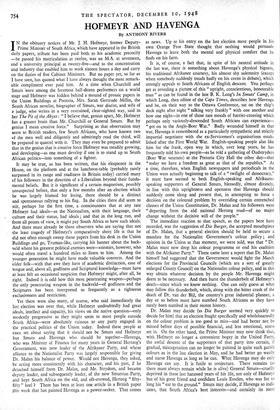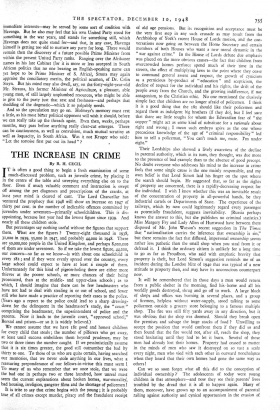HOFMEYR AND HAVENGA
By ANTHONY RIVERS
y N the obituary notices of Mr. J. H. Hofmeyr, former Deputy-
Prime Prime Minister of South Africa, which have appeared in the British daily papers, tribute has been paid both to his academic precocity —he passed his matriculation at twelve, was an M.A. at seventeen, and a university principal at twenty-five—and to the concentration and industry that enabled him to work sixteen hours a day and carry on the duties of five Cabinet Ministers. But no paper yet, so far as I have seen, has quoted what I have always thought the most remark- able compliment ever paid him. At a time when Churchill and Smuts were among the foremost half-dozen performers on a world stage and Hofmeyr was hidden behind a mound of prosaic papers in the Union Buildings at Pretoria, Mrs. Sarah Gertrude Millin, the South African novelist, biographer of Smuts, war diarist, and wife of judge, who writes in a very restrained, clear-sighted way, said in her The Pit of the Abyss: "I believe that, genius apart, Mr. Hofmeyr has a greater brain than Mr. Churchill or General Smuts. But by genius I mean creative force." Surprising as that observation may seem to British readers, few South Africans, who have known two of the men well and diligently and admiringly read the third, will be prepared to quarrel with it. They may even be prepared to admit that in the genius that is creative force Hofmeyr was steadily growing, and developing—as one must develop if one is to stand up to South African politics—into something of- a fighter.
It may be true, as has been written, that his eloquence in the House, on the platform and at the luncheon-table (probably rarely surpassed in its range and readiness in Britain today) carried many of his followers in the direction of a Liberalism beyond their funda- mental beliefs. But it is significant of a certain magnetism, possibly unsuspected before, that only a few months after an election which he was largely blamed for losing, there should be a distinct and spontaneous rallying to his flag. In the cities there did seem to stir, perhaps for the first time, a consciousness that at any rate Hofmeyr had ideals—as the Nationalists, with their language, their culture and their status, had ideals ; and that in the long run, and from all points of view., it might pay South Africa to have such ideals. And there must already be those observers who are saying that not the least tragedy of Hofmeyr's comparatively short life is that he did not often enough sweep those papers from his desk in the Union Buildings and go, Truman-like, carrying his banner about the back- veld where his greatest political enemies were—enemies, however, who would often travel a hundred miles to listen to him. Among the younger generation he might have made valuable converts. And the older folk—with that awe they have of academic distinction, ease of tongue and, above all, godliness and Scriptural knowledge—must have at least felt an occasional suspicion that Hofmeyr might, after all, be right. Indeed it is odd how this most penetrating weapon—perhaps the only penetrating weapon in the backveld—of godliness and the Scriptures has been interpreted so frequently as a righteous exclusiveness and restriction.
Yet there were also many, of course, who said immediately the last election was over that, while Hofmeyr undoubtedly had great ideals, intellect and capacity, his views on the native question—only modestly progressive as they might seem to most people outside South Africa—were absolutely ruinous to any party engaged in the practical politics of the Union today. Indeed these people at once set about saying that it should not be Smuts and Hofmeyr but Smuts and Havenga who should be together—Havenga, who was Minister of Finance for many years in General Hertzog's Government, was now leader of the Afrikaner Party, and whose alliance to the Nationalist Party was largely responsible for giving Dr. Malan his balance of power. Would not Havenga, they asked, be acting more consistently with his character, and his past, if he detached himself from Dr. Malan, and Mr. Strydom, and became deputy leader, and subsequently leader, of the now Smutsian Party, and kept South Africa on the old, and oft-avowed, Hertzog " fifty- fifty" keel ? There has been at least one article in a British paper this week that has painted Havenga as a power-seeker. That comes
as news. Up to his entry on the last election most people in his own Orange Free State thought that nothing would persuade Havenga to leave both the mental and physical comfort that he finds on his farm.
It is, of course, a fact that, in spite of his neutral attitude in the last war, there is something about Havenga's physical bigness, his traditional Afrikaner courtesy, his almost shy solemnity (except when somebody suddenly treads badly on his corns in debate), which strongly appeals to South Africans of English descent. You perhaps get as revealing a picture of this " upright, conscientious, honourable man " as can be found in the late B. K. Long's In Smuts' Camp, in which Long, then editor of the Cape Times, describes how Havenga and he, on their way to the Ottawa Conference, sat on the ship's deck night after night "talking very frankly" with one another and how one night—in one of those rare moods of barrier-crossing which perhaps only variously-descended South Africans can experience- " got on to the Anglo-Boer War." Badly wounded himself in that war, Havenga is remembered as a particularly sympathetic and strictly impartial negotiator with the ex-Servicemen's organisations estab- lished after the First World War. English-speaking people also like him for the frank, open way in which, over long years, he has frequently told his own people—as he told a gathering of Oudstryders (Boer War veterans) at .the Pretoria City Hall the other day—that " today we have a freedom as great as that of the republics." At a time, therefore, when English newspapers and periodicals in the Union were actually beginning to talk of a " twilight of democracy," it must have seemed to both English-speaking and Afrikaans- speaking supporters of General Smuts, blessedly, almost divinely, in line with this uprightness and openness that Havenga should suddenly come along and protest that, in attempting to force a decision on the coloured problem by overriding certain entrenched clauses of the Union Constitution, Dr. Malan and his followers were " departing from the old national Hertzog road—of no major change without the decisive will of the people."
The immediate reaction to that speech, as the papers here have recorded, was the suggestion of Die Burger, the accepted mouthpiece of Dr. Malan, that a general election should be held to secure a mandate for the Nationalist Government's colour policy ; and opinion in the Union at that moment, we were told, was that " Dr. Malan must now drop his colour programme or end his coalition with the Afrikaner Party." There came later a report that Dr. Malan himself had suggested that the Government would fight the March elections for the Provincial Councils (which are a sort of greatly enlarged County Council) on the Nationalist colour policy, and in this way obtain whatever decision by the people Mr. Havenga might deem to be necessary. And then burst the thunderbolt of Hofmeyr's death—since which we know nothing. One can only guess at what may follow this thunderbolt, which, along with the bitter crash of the death of Dr. van der Bijl, the country's great industrial planner, a day or so before must have numbed South Africans as they have rarely been numbed in their recent history.
Dr. Malan may decide (as Die Burger seemed very quickly to decide for him) that an election fought specifically and wholeheartedly on the colour problem is too good to miss—and had better not be missed before days of possible financial, and less emotional, stress set in. On the other hand, the Prime Minister may now think that, with Hofmeyr no longer a convenient bogey in the United Party, the awful descent of the supporters of that party into certain, if gradual, miscegenation can no longer be painted in quite such garish colours as in the last election in May, and he had better go warily and nurse Havenga as long as he can. What Havenga may do only Havenga can say. It is futile to conjecture. There remains (as there must always remain while he is alive) General Smuts—cruelly deprived in these last harassed years of his life, not only of Hofmeyr but of his great friend and confidant Louis Esselen, who was for so long his " ear to the ground." Smuts may decide, if Havenga so indi- cates, that South Africa's best interests—and certainly its most immediate interests—may be served by some sort of coalition with Revenge. But he also may feel that his own United Party stood for something in the war years; and stands for something still, which Revenge does not quite stand for—and that, in any case, Havenga himself is getting too old to nurture any party for long. There would remain then the discovery of a future possible Prime Minister from within the present United Party ranks. Ranging over the Afrikaner names in his late Cabinet (for it is more or less accepted in South African politics that no one bearing an English-speaking name can yet hope to be Prime Minister of S. Africa), Smuts may again appraise the conciliatory merits, the political acumen, of Dr. Colin Steyn. But his mind may also dwell, say, on thvforty--eight-year-old Mr. Strauss, his former Minister of Agriculture, a pleasant; able young man, of still largely unplumbed resources, who might be able to give to the party just that zest and freshness—and perhaps that shedding of the dogmatic—which it so palpably needs.
And so the speculation may go on. Hofmeyr's memory must rest a little, as his most bitter political opponent will wish it should, before we can really take up the threads again. Even then, weeks, perhaps months, may pass before anything really clear-cut emerges. There can be cautiousness, as well as convulsion, much mutual scrutiny as well as loquacity, in South Africa. Was it not Kruger who said: "Let the tortoise first put out its head " ?















































 Previous page
Previous page